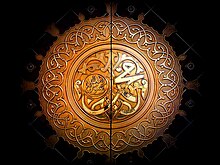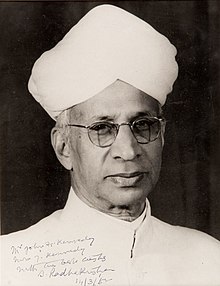Portal:Religion
The Religion Portal
Religion is a range of social-cultural systems, including designated behaviors and practices, morals, beliefs, worldviews, texts, sanctified places, prophecies, ethics, or organizations, that generally relate humanity to supernatural, transcendental, and spiritual elements—although there is no scholarly consensus over what precisely constitutes a religion. Different religions may or may not contain various elements ranging from the divine, sacredness, faith, and a supernatural being or beings. (Full article...)
 Vital article
Vital article
Shia Islam (/ˈʃiːə/) is the second-largest branch of Islam. It holds that the Islamic prophet Muhammad designated Ali ibn Abi Talib (656–661 CE) as his successor (Arabic: خليفة, romanized: khalifa) as Imam (Arabic: امام, lit. 'spiritual and political leader'), most notably at the event of Ghadir Khumm, but that after the Prophet's death, 'Ali was prevented from succeeding as leader of the Muslims as a result of the choice made by some of Muhammad's other companions (Arabic: صحابہ, romanized: sahaba) at Saqifah. This view primarily contrasts with that of Sunni Islam, whose adherents believe that Muhammad did not appoint a successor before his death and consider Abu Bakr, who was appointed caliph by a group of Muhammad's other companions at Saqifah, to be the first rightful (rashidun) caliph after Muhammad (632–634 CE). (Full article...)
 Did you know (auto-generated)
Did you know (auto-generated)
- ... that fictional religions, often described in speculative fiction, have in some cases inspired real religious movements?
- ... that the nonconformist minister Ichabod Chauncey was banished from England under the Religion Act 1592 and spent two years in exile in Holland where he published a defence of his actions?
- ... that across his thirty-six collections, fashion designer Alexander McQueen contemplated religion, told fairy tales, and criticized the fashion industry?
- ... that a religious community is a group of people who practice the same religion, but do not have to live together?
- ... that Freedom of Religion South Africa filed an unsuccessful lawsuit to keep child spanking legal?
- ... that Gamaliel's principle has been used to support religious pluralism and reforms within religious groups?
Bob Dylan (legally Robert Dylan; born Robert Allen Zimmerman, May 24, 1941) is an American singer-songwriter. Often considered to be one of the greatest songwriters, Dylan has been a major figure in popular culture over his 60-year career. He rose to prominence in the 1960s, when songs such as "The Times They Are a-Changin'" (1964) became anthems for the civil rights and antiwar movements. Initially modeling his style on Woody Guthrie's folk songs, Robert Johnson's blues and what he called the "architectural forms" of Hank Williams's country songs, Dylan added increasingly sophisticated lyrical techniques to the folk music of the early 1960s, infusing it "with the intellectualism of classic literature and poetry". His lyrics incorporated political, social and philosophical influences, defying pop music conventions and appealing to the burgeoning counterculture. (Full article...)













































![Image 1 Prometheus tortured by the eagle (black-figure kylix, 560-550 BC) In Greek mythology, Prometheus (/prəˈmiːθiəs/; Ancient Greek: Προμηθεύς, [promɛːtʰéu̯s], possibly meaning "forethought") is one of the Titans and a god of fire. Prometheus is best known for defying the Olympian gods by taking fire from them and giving it to humanity in the form of technology, knowledge and, more generally, civilization. (Full article...)](http://upload.wikimedia.org/wikipedia/en/d/d2/Blank.png)





















